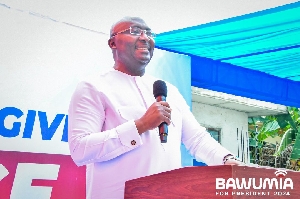- Home - News
- TWI News | TV
- Polls
- Year In Review
- News Archive
- Crime & Punishment
- Politics
- Regional
- Editorial
- Health
- Ghanaians Abroad
- Tabloid
- Africa
- Religion
- Election 2020
- Coronavirus
- News Videos | TV
- Photo Archives
- News Headlines
- Press Release
Business News of Monday, 24 March 2014
Source: Daily Guide
Government gives away oil blocks

The Africa Centre for Energy Policy (ACEP) has expressed worry over the rate at which government is throwing out promising oil blocks to relatively inexperienced oil companies.
The policy think-tank stated that such contracts were being awarded on the blind side of Ghanaians, the primary owners of Ghana’s oil and gas resources. At the weekend, Parliament approved two new oil contracts under a certificate of urgency. The contracts, which were approved by Parliament, were laid before the House on 27th February 2014.
In a statement issued Friday in Accra, ACEP said the contracts were approved less than six hours after the notice of the motion for the approval was given. “This contradicts Parliament’s own Standing Order 80(1) which provides that a motion can be moved after 48 hours have elapsed from the time of notice.”
The first of these contracts was over the expanded Shallow Water Tano Block between the Government of Ghana, GNPC, CAMAC Energy Ghana Limited and Base Energy Ghana Limited.
The second contract over the Central Tano Block Offshore was between the Government of Ghana, GNPC and AMNI International Petroleum Development Company (Ghana) Limited.
“We are well aware of Parliament’s role in resource contract ratification as prescribed in Article 268 of the 1992 Constitution. This, we believe, was intended to protect the interest of Ghana and it was based on the belief that Parliament could do due diligence on these contracts.
“Why Parliament agreed to approve these two new oil contracts under a certificate of urgency defies not only constitutional logic but also has huge implications for our oil wealth.
“We think that the rush of oil contract ratifications and the secrecy in the award of these contracts are attempts at avoiding the scrutiny of these contracts by citizens, which thereby undermines the democratic rights”, it underscored.
Apart from the above contracts, it noted that Government had also issued the right of first refusal to Miura Petroleum Limited and its partner Gondwana Petroleum to negotiate a new contract over the Offshore Cape Three Points South Block.
It noted that a disturbing aspect about all the contracts was that the oil blocks that were being awarded were located in known areas of the Tano Basin on which substantial 2D and 3D seismic data were already available, including a number of discoveries in the area.
The situation in other countries
“Experience in most oil-producing countries suggests that oil blocks from known areas are awarded through open and competitive process because such areas have been de-risked and provide opportunity for the state to negotiate better terms.
This is not the case in Ghana as promising oil blocks are ‘given away’ on selective basis to questionable companies that have no capacity, thus putting Ghana at a disadvantage.”
It said also that the beneficial ownership behind the companies was also not known. “Parliament’s Energy and Mines Committee has also not demonstrated a scrutiny of the beneficial owners in its report to Parliament and especially the financial capacity of the local firms.
“Unlike the AGM contract from which the Committee disclosed the beneficial owner of MED Songhai, the same has not been done for these new contracts, raising questions on who the owners are.
For instance, the Committee provides that Base Energy, the local Ghanaian company on the Expanded Shallow Water Tano Block, is owned by Energy West Limited (75 percent) and African Soft Limited (25 percent).
AMNI International Petroleum Development Company (Ghana) Limited is owned by AMNI Nigeria (70 percent) and an indigenous Ghanaian company, WCW International Company Limited (30 percent). “But this information does not satisfy the disclosure requirement of beneficial owners.”
No beneficial Government ownership information
Whilst Ghanaian participation in oil operations is commendable and consistent with the Local Content Regulations (LI2204), Government should as a matter of democratic principle, disclose their beneficial ownership information in the spirit of transparency.
“This, in our view, prevents fronting for foreign and Ghanaian interests.” It observed also that the path the authorities were taking was not in the interest of Ghana, especially when Government was determined to rush petroleum contracts ahead of a progressive petroleum law whose process it had begun.
“Perhaps, this explains the delay in passing the new Petroleum Bill since 2012, which in our view is more urgent than the current oil contracts. Ironically, the new Petroleum Bill was supposed to have prevented the kind of rush and secrecy we are witnessing in Ghana today.”
Noting that Ghana must show an example of a country determined to break away from the oil curse, it further commented: “We recall how two earlier contracts, AGM and Cola Natural resources, were not debated in Parliament late last year.
Now, we are approving two new oil contracts under certificate of urgency. Where is the transparency we are hoping for? Where is Parliament’s credibility? “We wish to renew our earlier call for a moratorium on all new petroleum licensing until the new Petroleum (Exploration and Production) Bill is passed into law.”










